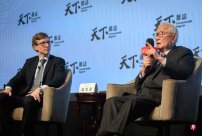(Shanghai Comprehensive News) The United States has issued a new round of export control measures to limit China's purchase of high -end chips, and Chinese semiconductor stocks fell collectively after the opening on Monday.The analysis pointed out that new measures may reduce the growth rate of China's largest chip manufacturer next year, and the global semiconductor industry will be severely frustrated.
According to the Securities Times website, SMIC's stock price fell 5.2 % on Monday (October 10), a decline in the largest market since August 15.Hua Hong semiconductor plunged 10.4%, and Fudan Microelectronics plummeted by 25%.More than a dozen semiconductor stocks such as Haiguang Information, Tuojing Technology, Sino -Micro Corporation, Lanqi Technology, and Northern Huachuang also fell or fell by more than 10%.
The semiconductor field has fallen sharply after the beginning of the downturn's financial newspaper, which has caused the outside world to worry that the decline in the semiconductor industry is far from over.
Analyst Shen Ming believes that the new export restrictions hinder the construction of production capacity. SMIC's sales growth rate in 2023 may be 50%lower than his previous expectations.
He analyzed that about 48%of SMIC's production capacity before the end of next year, about 48%of the equipment from American tool manufacturers such as Panlin Group and application materials.
The US Department of Commerce last Friday (7th) announced a comprehensive provisions of restricting the sale of semiconductors and chip manufacturing equipment to Chinese customers, which aims to limit the development of the Chinese chip industry and crack down on China to obtain key technologies required from supercomputers to guidance weapons and other fields.Ability.This is the most aggressive move that the Bayeng government has taken in trying to prevent the development of China's technical capabilities so far.
Bloomberg reported that Nomura Holdings analyst Wang David (transliteration) said in a report that these restrictions were "major setbacks" for China, and they were also "bad news" for the global semiconductor industry; China's localization efforts may be possibleIt is also "facing risks because it may not be unable to use advanced foundries in Taiwan and South Korea."
Pattel, chief analyst of analyst Semianalysis, believes that China and the United States have officially fallen into a "economic war".
He estimates that these restrictions may reduce global technology and industrial trade by hundreds of billions of dollars.
Chinese official media and foreign officials have strongly opposed the United States in the past weekend, warning that restrictions on measures "not only harm the legitimate rights and interests of Chinese companies, but also affect the rights and interests of American companies."
Foreign Ministry spokesman Mao Ning said on Saturday (8th) that the United States will political and economic and trade issues politically, tools, and weapons, and cannot stop China's development. It will only block itself and fight against themselves.
Gu Wenjun, chief analyst of China Semiconductor Research Institution Research Institution Research, wrote in the online review: "Our reality is that the United States has taken the chip as a tool to curb China ... There is no possibility of reconciliation."
He Xiaopeng, chairman and chief executive officer of Xiaopeng Automobile, also warned last month that the constant upgrade of the United States' restrictions on chip exports will hinder China's autonomous driving industry.


